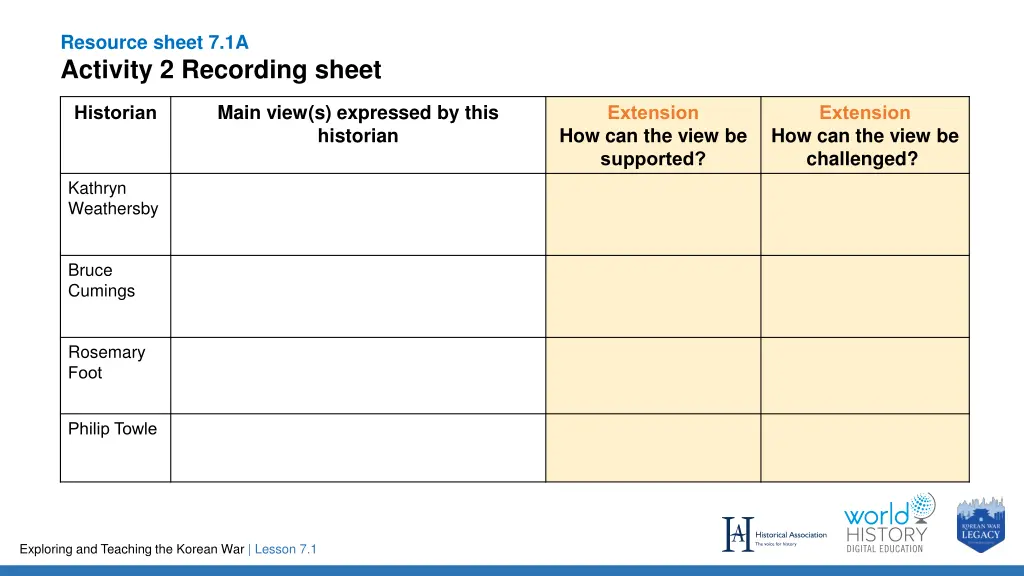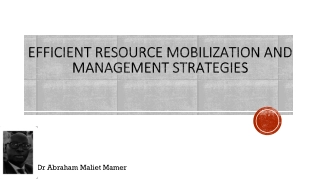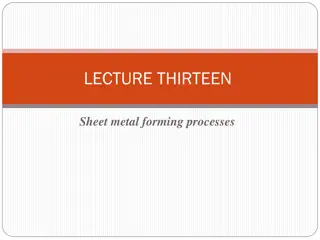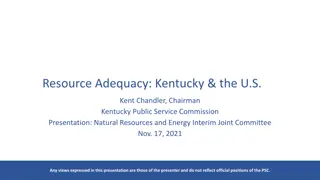
Perspectives on the Korean War: Historian Views Explored
Explore differing perspectives on the Korean War from historians Kathryn Weathersby, Bruce Cumings, and Rosemary Foot. Learn about the reasons behind the war extension, the devastating impact of aerial bombings, and the complexities of peacemaking efforts. Challenge and support these views to deepen your understanding of this historical event.
Download Presentation

Please find below an Image/Link to download the presentation.
The content on the website is provided AS IS for your information and personal use only. It may not be sold, licensed, or shared on other websites without obtaining consent from the author. If you encounter any issues during the download, it is possible that the publisher has removed the file from their server.
You are allowed to download the files provided on this website for personal or commercial use, subject to the condition that they are used lawfully. All files are the property of their respective owners.
The content on the website is provided AS IS for your information and personal use only. It may not be sold, licensed, or shared on other websites without obtaining consent from the author.
E N D
Presentation Transcript
Resource sheet 7.1A Activity 2 Recording sheet Main view(s) expressed by this historian Historian Extension Extension How can the view be supported? How can the view be challenged? Kathryn Weathersby Bruce Cumings Rosemary Foot Philip Towle Exploring and Teaching the Korean War | Lesson 7.1
Resource sheet 7.1A Historian A: Katharine Weathersby on why the war did not end in 1951 Once China entered the Korean War in October 1950 and saved the DPRK from extinction, the North Korean leadership had little say in how the war was run. The Chinese took over day-to-day management of the fighting and Soviet leader Joseph Stalin had the final voice on all important decisions. As a result, when Stalin decided in January 1951 to prolong the war for two to three years to tie down American forces in Korea while the Soviets and East Europeans rearmed, the North Koreans were forced to acquiesce, even though it meant subjecting their country to complete destruction from US bombing. https://www.icasinc.org/bios/weathers.html Exploring and Teaching the Korean War | Lesson 7.1
Resource sheet 7.1A Historian B: Korea s Place in the Sun, Bruce Cumings, 1997 By 1952 just about everything in northern and central Korea was completely leveled. What was left of the population survived in caves, the North Koreans creating an entire life underground, in complexes of dwellings, schools, hospitals and factories American officials sought to use aerial bombing as a type of psychological and social warfare As Robert Lovett later put it, If we keep on tearing the place apart, we can make it a most unpopular affair for the North Koreans. We ought to go right ahead . The Americans did go right ahead and in the final act of this barbaric air war hit huge irrigation dams that provided water for 75 percent of the North s food production. Exploring and Teaching the Korean War | Lesson 7.1
Resource sheet 7.1A Historian C: A Substitute for Victory: Politics of Peacemaking at the Korean Armistice Talks, Rosemary Foot,1990 This study shows that the portrayal of Communist intransigence, against an implied flexibility on the part of U.S. officials, has never been an adequate explanation for the protracted length of these new negotiations; above all, it neglects detailed consideration of the complex domestic and international environments in which these talks took place. For example, it does not consider the difficulties of negotiating for the United States a major power that, in the past, had always been extraordinarily successful in its employment of force. Neither does this assumption consider the additional problems that might have been introduced through the decision to use U.S. military personnel in talks that were essentially political. Such a depiction of a U.S. willingness to compromise also ignores the presence of domestic political critics in America who were only too ready to equate compromise with that negative term appeasement and to revive support for General Douglas MacArhur s argument that there was no substitute for victory . This portrayal of U.S. flexibility pitted against Communist intransigence also does not take into account the complicated decision-making structure present during the Korean negotiations. As head of the U.N. Command, the United States did play the dominant role in the talks but was still subject to constraints imposed not only by Western allies who favoured compromise but also Asian allies, notably South Korea, who encouraged inflexibility. Finally, such a depiction of the U.S. role in the discussions does not consider the delay that policy divisions within the administration caused divisions between officials in Korea and those in Washington, in addition to those among officials from the various executive departments in the nation s capital These opposing positions were frequently forged into a policy consensus during the course of the negotiations rather than prior to them, with negative psychological consequences for those charged with the task of negotiating. Exploring and Teaching the Korean War | Lesson 7.1
Resource sheet 7.1A Historian D: Democracy and Peace Making: negotiations and debates 1815 1973, Philip Towle, 2000 The debate and the exchange of insults went on through successive days. On one occasion neither side had anything to propose and the negotiators sat in silence for more than two hours. Generally the POW and the various political issues prevented any meeting of minds. The communists argued that the UN principle of voluntary repatriation reflected their determination to hand large numbers of POWs to certain friends in South Korea and Taiwan, in other words to Syngman Rhee and Chiang Kai Shek. They dismissed the UN proposals as absurd, unreasonable and ridiculous . In the meantime there were military, political and ethical arguments between the UN commanders and the South Korean government under President Syngman Rhee, between the State and Defense Departments in Washington and between the various nations contributing to the UN forces. Syngman Rhee was opposed to the negotiations because he wanted to reunite the peninsula by force, a position he maintained to the end. On 30 June 1951 he had demanded the withdrawal of the Chinese forces, disarmament of North Korean communists and guarantees that no external power would assist them. Such demands were clearly not negotiable and had been tacitly ignored by the US administration. Meanwhile, Rhee s attacks on the negotiations continued. Exploring and Teaching the Korean War | Lesson 7.1





















